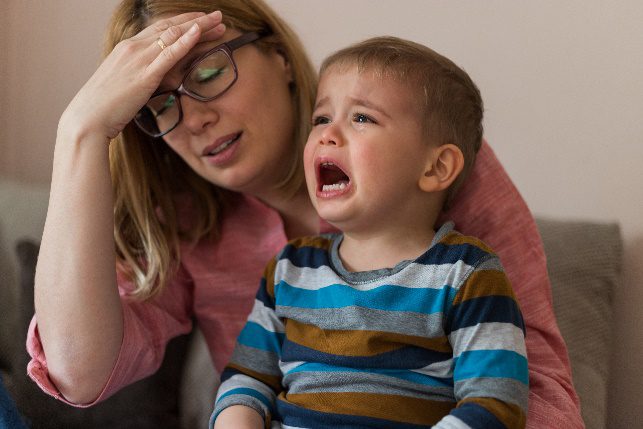It is Monday morning at 9:00 and the phone rings at Pediatric Speech and Language Specialists. A mother is on the telephone saying her pediatrician has told her to call. She states “My son Connor is twenty-one months and hasn’t said any words yet. We know he hears, because he runs from the other side of the house when he hears his favorite TV show. He even knows when I approach his bedroom. He responds to his name and is able to follow simple directions. I am concerned because he is so quiet. Connor did not babble much as a baby and has never said mama or dada. He simply points and grunts by saying ‘uh-uh’. Lately, he takes me by the hand trying to show what he wants. He has become so frustrated he has begun to throw toys, hit and even bite me.” Connor’s mom continues on to say that Connor’s grandparents have told her that boys often speak late and his dad didn’t speak until he was three, so we just need to give him time to catch up. Connor’s mom goes on to say, “I don’t understand, he seems to be just fine in every way except speaking!”
Connor certainly is a “late talker,” which is a term used to describe children 18 to 20 months old who have fewer than 10 words, or those 21 to 30 months old who have fewer than 50 words and no two-word combinations. Many times, these children have no other problems and are typically developing in the areas of comprehension, play, motor and cognitive/learning skills. Late talker are puzzling to parents because they show all the potential for being ready to talk but simply don’t. Researchers have yet to agree upon an explanation for this type of language delay, however they have determined that Late Talkers are more likely to be male, have a family history of early language delay, and to have been born at less than 85% of their optimal birth weight or at less than 37 weeks gestation [1]. It has also been determined that approximately 13% of two year olds are late talkers [2]. Higher prevalence rates have been noted in a population of toddler-age twins (38%) with a greater proportion in monozygotic twins (48.1%) compared with dizygotic twins (32.6%)[3]. Speech and language delays are the leading developmental concern in parents of children younger than 5 years. An estimated 15% to 25% of young children have some type of communication disorder [5].
What are the predictors or risk factors of continued language delay?
The tendency to assume that because this group of children is progressing so well in other areas of development, they will catch up on their own. In reality, many late talkers do “grow out of it”, but many do not. It can be difficult to predict which children will not catch up to their peers. How can you tell if your child is just a late bloomer or has a speech or language disorder?
A list of risk factors has been identified, which suggest that a child is more likely to have continuing language difficulties [4].
There are warning signs of a speech disorder that appear in the first years of life and that, if ignored, result in persistent speech problems. One major review in the speech pathology literature paints a profile of toddlers 18 to 24 months old at risk for language impairment at 36 to 48 months and who should receive early intervention [6]. The greater the number of warning signs a child exhibits (especially the closer he gets to 3 years of age), the greater the need for early assessment. Those signs include:
- a history of ear infections
- quiet as an infant; little babbling
- limited number of consonant sounds
- does not imitate (copy) words but relies on direct model and prompting
- uses mostly nouns (names of people, places, things), and few verbs (action words)
- difficulty playing with peers (social skills); interactions with adults more than peers
- a family history of communication delay, learning or academic difficulties
- a mild comprehension (understanding) delay for his or her age
- uses few gestures to communicate (the late bloomer who caught up used significantly more gestures than the child who had persistent delay)
- immature play skills
Why should we get our child an evaluation?
Don’t wait and hope your child will outgrow a communication problem. Even though some children catch up to their peers by the time they enter school, studies are showing that this group of children do not perform as well as their peers in certain aspects of language use such as language complexity and grammar [3]. A child who demonstrates communication delay as a toddler and during preschool is at greater risk of later language-based learning disabilities, including reading disabilities (dyslexia). These children typically have deficits in phonologic awareness, the ability to segment words into sounds, and expressive language disorders [9]. Early spoken language disorders can result in problems with reading, writing, and learning. They also may lead to problems with social skills, like making friends. Early detection leads to early treatment. The earlier you get help for your child, the better.
References
- Ellis, E. & Thal, D. (2008). Early Language Delay and Risk for Language Impairment. Perspectives on Language Learning and Education, 15: 93-100.
- Telethon Institute for Child Health Research (2008, May 16). Mixed Results For Late-talking Toddlers. ScienceDaily. 16 May 2008. Web. 10 Jun. 2011.
- Rice, M. L., Zubrick, S. R., Taylor, C. L., Gayan, J., & Bontempo, D. (2014). Late language emergence in 24-month-old twins: Heritable and increased risk for late language emergence in twins. Journal of Speech, Language, and Hearing Research, 57, 917-928.
- Olswang, L.B., Rodriguez, B. & Timler, G. (1998). Recommending Intervention for Toddlers With Specific Language Learning Difficulties: We May Not Have All the Answers, But We Know a Lot. American Journal of Speech Language Pathology, 7, 23 – 32.
- New York State Department of Health, Early Intervention Program. Clinical Practice Guideline: The Guideline Technical Report, Communication Disorders, Assessment and Intervention for Young Children (Age 0-3 Years). 1999, New York State Department of Health, Albany, N.Y.; II 3-16, III 13-25, III 85, III 89-95
- Agin, M., “The Late Talker—When Silence Isn’t Golden” retrieved from https://cherabfoundation.org/2004/when-silence-isnt-golden/Nov 1, 2004
- Late Language Emergence retrieved from https://www.asha.org/PRPSpecificTopic.aspx?folderid=8589935380§ion=Incidence_and_Prevalence
- Lowry, L., How to Tell if Your Child is a Late Talker – And What to Do about It, retrieved from http://www.hanen.org/helpful-info/articles/how-to-tell-if-your-child-is-a-late-talker-%E2%80%93-and-w.aspx Shaywitz SE: Dyslexia. N Engl J Med 1998;338:307





